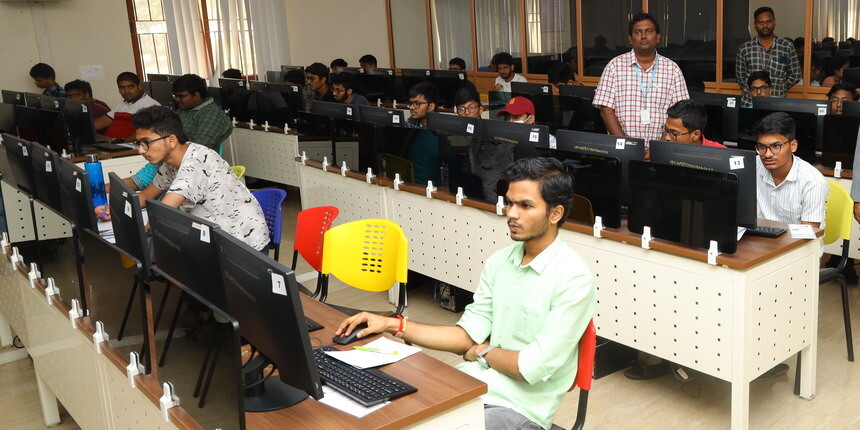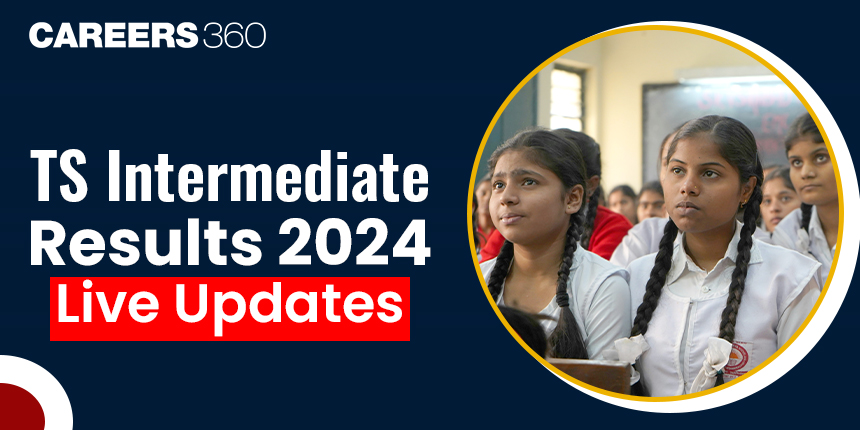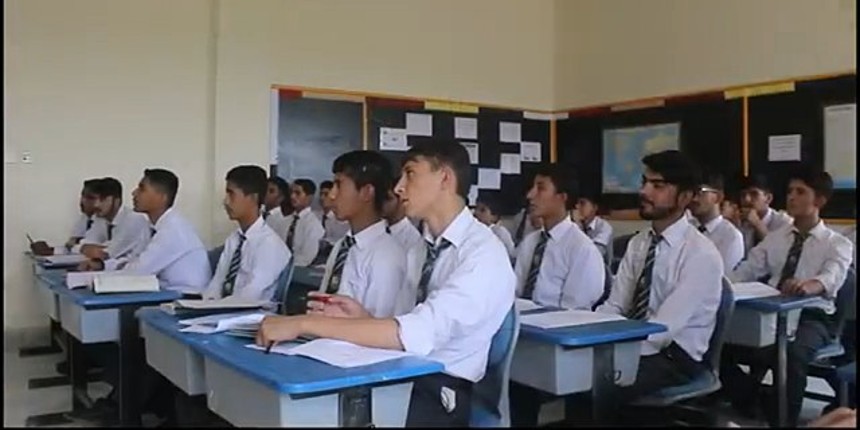Minor degrees are helping fill BTech seats in engineering colleges
AICTE’s introduction of minor degrees in emerging technologies is helping core engineering branches, equipping BTech graduates with skills.
 The Approval Process Handbook 2023 added eight more including VLSI design and technology, advanced web development and a few others. (Image Source: VIT-AP University))
The Approval Process Handbook 2023 added eight more including VLSI design and technology, advanced web development and a few others. (Image Source: VIT-AP University))Sheena Sachdeva | April 27, 2023 | 02:17 PM IST
NEW DELHI: In 2020-21, the All India Council for Technical Education (AICTE), the apex regulatory body for technical education, introduced the concept of “minor degrees” in engineering. Its Approval Process Handbook for that year said that a BTech student from one department can pursue a “minor specialisation in emerging areas” offered by a different department and collect a “minor degree” from the second branch. Three years later, that provision may have helped arrest the decline in interest in certain core engineering branches.
In 2020-21, the AICTE had allowed 39 minor-degree courses. But in 2023-24, the AICTE permitted all subjects to be taught as minor degree courses in combination with other courses at all levels. “I request to you all that the student should be given a genuine choice with the flexibility of choosing the minor subject. The universities have to create this workable and genuine system offering an array of formats of courses,” says AICTE chairman TG Sitharam’s foreword to the 2023 handbook.
Live Updates | JEE Main Results 2023
The AICTE also established committees to frame model curricula for minor degrees in several branches. Shantipal Suresh Ohol of COEP Technological University (originally, College of Engineering Pune) is chairing the committee for the minor degree in robotics and said that institutes are now required to offer a minor degree over and above the specialised BTech.
Also Read | AICTE Approval Process Handbook 2023: Five major changes for engineering colleges
Model curriculum for minor engineering degrees
Originally, the AICTE had allowed minor degrees in 39 subjects, most from emerging technologies. These included artificial intelligence and machine learning, data science, internet of things, virtual and augmented reality, systems engineering, robotics, green technology and sustainable engineering. The 2023 handbook added eight more including VLSI design and technology, business development, marketing and finance, advanced web development, and Indian knowledge systems.
Plus, model curricula are being framed for minor degrees in the list of subjects given below.
Minor degree model curricula
Artificial intelligence |
Blockchain |
Cyber security |
Data science |
Internet of things |
Robotics |
Virtual and augmented reality |
Electronics engineering (VLSI design and technology) |
Sustainable energy engineering |
Advanced web development |
Universal human values |
“For undergraduate minor degree courses, AICTE has outlined curricula where it noticed that students and colleges require guidance, and [that] can also be a promising technology course for students,” said Ohol.
 Shantipal Suresh Ohol, COEP Pune
Shantipal Suresh Ohol, COEP Pune
Also Read | BTech Placements: How mass tech layoff has put fresher jobs at risk
BTech: Flexible structure
Through minor degrees, AICTE has introduced flexibility in the undergraduate engineering programme. “Now, students, despite pursuing a particular degree in engineering, will get the opportunity to learn upcoming technologies and skills; and explore new avenues. These minor degrees are designed to address the dynamic environment of technology globally,” said Chetan Singh Solanki, professor at Indian Institute of Technology (IIT) Bombay, who is chairing the committee tasked with preparing the model curriculum for the minor degree in sustainable energy engineering.
Undergraduate students can now study courses from emerging and/or multidisciplinary fields offered by departments other than their own, earning a minimum of 18-20 additional credits to earn a minor degree, says AICTE’s latest handbook. These credits can be transferred from the government e-learning platform, SWAYAM, and these courses will also be mentioned as specialisations in the degree. For example, after collective 18-20 extra credits in robotics, over and above the 160 credits required for mechanical engineering, the student shall earn a BE or BTech in mechanical engineering with specialisation in robotics.
Solanki said: “From the second semester onwards, a student can take one extra course every semester leading to a minor degree in that branch.”
“Many institutes are already using this concept but now all engineering colleges have to implement this,” added SK Saha, a robotics minor degree committee member and professor at IIT Delhi.
 SK Saha, mechanical engineering department, IIT Delhi
SK Saha, mechanical engineering department, IIT Delhi
Students can pursue these courses after their diploma, ITI courses, and four-year full-time engineering courses, and receive minor degrees, added Ohol.
AICTE has also given freedom to universities and institutes to draft curricula for any course for which a model curriculum is not available on the AICTE website.
Also Read | AICTE lifts moratorium to set up new technical institutions
Becoming industry-ready
“While the concept of minor and major degree have been there for quite some time, especially in all IITs, there is now more emphasis on providing students with a mix of fundamental and applied knowledge,” said Siva Rama Krishna Vanjari, professor, electrical engineering department at IIT Hyderabad and chairperson for the VLSI design technology minor curriculum committee. “From the minor degree courses students will learn more industry-oriented skills. They will gain basic knowledge but not expertise in that area but can communicate with the experts.”
 Siva Rama Krishna Vanjari, electrical engineering department, IIT HyderabadWhile implementation is still in process, Ohol said that students from remote parts of the country can leverage this opportunity. “For students will get the flavour of degree level subjects taught at IITs, maybe a step ahead of them,” stated Ohol.
Siva Rama Krishna Vanjari, electrical engineering department, IIT HyderabadWhile implementation is still in process, Ohol said that students from remote parts of the country can leverage this opportunity. “For students will get the flavour of degree level subjects taught at IITs, maybe a step ahead of them,” stated Ohol.
This has had the encouraging effect of inciting interest in engineering itself. Three years ago, AICTE had imposed a moratorium on the establishment of new engineering colleges due to swathes of seats going vacant in existing ones. But this year, it has lifted the ban. “This is because with the introduction of industry-relevant courses now and minor degrees, we are hopeful that there will be no vacant seats,” said another professor, asking not to be named.
AICTE’s member secretary, Rajive Kumar, had earlier told Careers360 that the increase in admissions in core branches was linked to the introduction of minor degrees.
Ohol said, “To bridge the gap between institutes and industry, minor degrees will help students make industry-ready. Through these degrees, students should be skilled in high-level technologies.”
The minor degrees are also expected to help engineering graduates find employment. “With India contributing 20% of global manpower, our country’s skillsets are majorly in the graduate level; we are scaling it up at the undergraduate level through these new-era technology courses,” added Vanjari.
Also Read | Minor BTech: At DBATU Maharashtra, pursue two branches of engineering together
One-of-a-kind curriculum
Many of the newly-developed minor degree curricula are one-of-a-kind and not yet taught even at premier institutions such as the IITs, said Ohol. These include courses like VLSI, robotics and sustainable energy engineering.
AICTE introduced a minor degree in sustainable engineering in 2022 “because energy is a common area, any engineering student can take a minor degree in sustainable energy”,
stated Solanki.
He explained: “The vision of the course is to ensure students understand the role of energy through the lens of the environment and figure out sustainable ways of generating and consuming energy.”
For both these courses, the curriculum committee advised hands-on training. “We have introduced a solar energy systems installation and maintenance course at the end for students to learn its implementation and gain real-life experience,” said Solanki.
Similarly, the robotics course includes a project at the end so that students get hand-on-experience and are taught practical components in the minor degree as well, said Ohol.
 Chetan Singh Solanki, department of energy science and engineering, IIT Bombay
Chetan Singh Solanki, department of energy science and engineering, IIT Bombay
Also Read | How state engineering colleges are updating their BTech with internships, training
Guaranteeing longevity
Most academics find that the skillsets of graduating engineers need to be refined in tandem with the dynamic technologies.
The industries’ skills-set requirements are changing rapidly and engineering curricula have to keep up, changing to match the highly dynamic era of technologies, said Vanjari. He added that based on the requirements, the courses may be fine-tuned at a later point as well.
The minor degrees also ensure that fresh graduates can settle into industries more easily, ready with the skills they require and will continue to need in the future. Minor degrees in emerging technologies like AI, robotics, data science, and machine learning will remain relevant for long, said Ohol.
Today’s industry needs people with knowledge of emerging technologies and major specialisations in traditional engineering degrees like mechanical engineering, computer science engineering, electronics and electrical engineering. “While automation is happening everywhere, the need is for knowledge of different interdisciplinary subjects,” he added.
Follow us for the latest education news on colleges and universities, admission, courses, exams, research, education policies, study abroad and more..
To get in touch, write to us at news@careers360.com.




